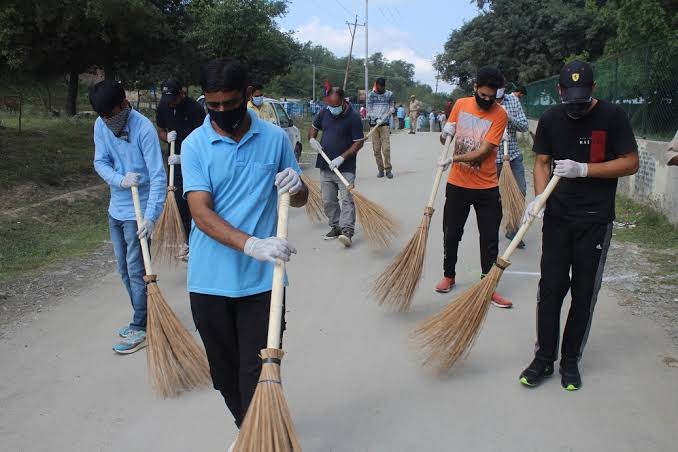
The Department of Drinking Water and Sanitation, Union Ministry of Jal Shakti, has recently given the green light to a substantial Rs 365.42 Crore plan dedicated to advancing sanitation efforts in Jammu and Kashmir under the Swachh Bharat Mission.
A comprehensive meeting was convened with the Department of Rural Development and Panchayati Raj Jammu Kashmir to discuss the intricacies of this initiative.
The multifaceted plan encompasses crucial aspects such as waste management, community complexes, and the development of sustainable sanitation systems.
During the approval committee meeting, which was presided over by Secretary DoDWS, Vini Mahajan, and attended by key officials including Jt Secretary Jitendra Srivastava, the Annual Implementation Plan was meticulously reviewed and approved.
Dr. Shahid Iqbal Choudhary, Secretary of the Rural Development Department and Panchayati Raj Jammu and Kashmir, delivered a comprehensive presentation before the committee.
Alongside Director General Rural Sanitation, Anoo Malhotra, he shed light on the various elements of the annual plan outlay amounting to Rs 365.42 Crore.
This ambitious plan aims to create assets in rural areas, focusing on waste management, community support, and the maintenance of these assets. The coverage extends to tourist destinations, religious places, and educational institutions.
A significant emphasis of the plan is the establishment of operational Plastic Waste Management Units, providing essential services such as electricity supply, connectivity, and waste collection support.
A detailed policy for the utilization of shredded plastic in infrastructure projects, particularly in the road sector, is also part of the plan.
The department envisions the construction of 2000 community sanitary complexes, strategically covering priority destinations and previously underserved panchayats.
Assets dedicated to solid waste management, gray water management, biogas plants, sludge treatment plants, waste management facilities, and community awareness programs are among the major initiatives approved under the SBM annual implementation plan.
Sustainability is a key aspect, and efforts will be directed toward establishing and maintaining sanitation systems under the Annual Implementation Plan.
Dr. Shahid Iqbal highlighted the need for coverage in remote areas, women-centric initiatives, rural healthcare, and educational institutions.
Special attention is directed towards providing sanitation facilities to migratory tribal populations in highland pastures, vulnerable populations, and suburban areas with a focus on waste management facilities.
The Mission Director of SBM proposed the construction of 21,000 IHHL units, inclusive of coverage for all PMAY housing unit beneficiaries.
The plan encompasses the establishment of collection, storage, and segregation centers, vehicles for waste collection and transportation, individual and community compost pits, segregation bins, and safety materials for sanitation workers.
Capacity building for village-level committees and field staff is also a significant aspect of the plan.
Assistant Commissioners Development in all districts have been urged to include convergence with MGNREGA for creating assets dedicated to solid waste management, plastic waste processing, disposal, and grey water management.
Measures are also in place for coverage of households in coordination with the Jal Jeevan Mission.
Furthermore, the Rural Sanitation department is focusing on developing informative material under IEC for community-based initiatives targeting sanitation, sustainability, and waste management. A noteworthy inclusion in the SBM plan for the current year is sanitation during the Amarnathji Yatra.
The plan actively promotes community awareness and voluntary services for the overall sustainability of the sanitation initiatives.
Author Profile

Latest entries
 REGIONALApril 23, 2025‘Don’t kill innocents’: Kashmiri man died pulling strangers out of terror in Pahalgam
REGIONALApril 23, 2025‘Don’t kill innocents’: Kashmiri man died pulling strangers out of terror in Pahalgam Photo by New York TimesINDIAApril 23, 2025Pahalgam attack: India halts Indus Waters Treaty, Expels Pakistani military personnel
Photo by New York TimesINDIAApril 23, 2025Pahalgam attack: India halts Indus Waters Treaty, Expels Pakistani military personnel Representational ImageREGIONALApril 23, 2025Jammu Kashmir Police announces ₹20 lakh reward for leads in Pahalgam terror attack
Representational ImageREGIONALApril 23, 2025Jammu Kashmir Police announces ₹20 lakh reward for leads in Pahalgam terror attack Representational ImageREGIONALApril 23, 2025Fire erupts in Rainawari Srinagar, Fire tenders on job
Representational ImageREGIONALApril 23, 2025Fire erupts in Rainawari Srinagar, Fire tenders on job
